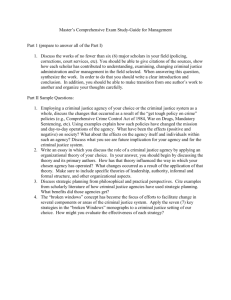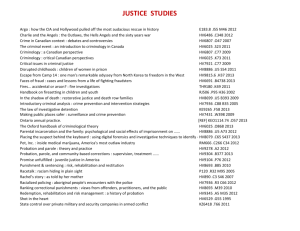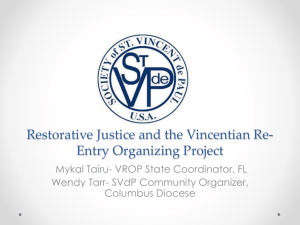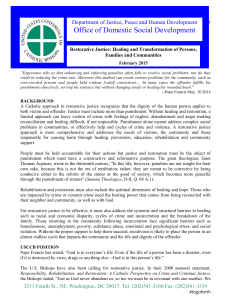Criminal and Restorative Justice - United States Conference of
advertisement
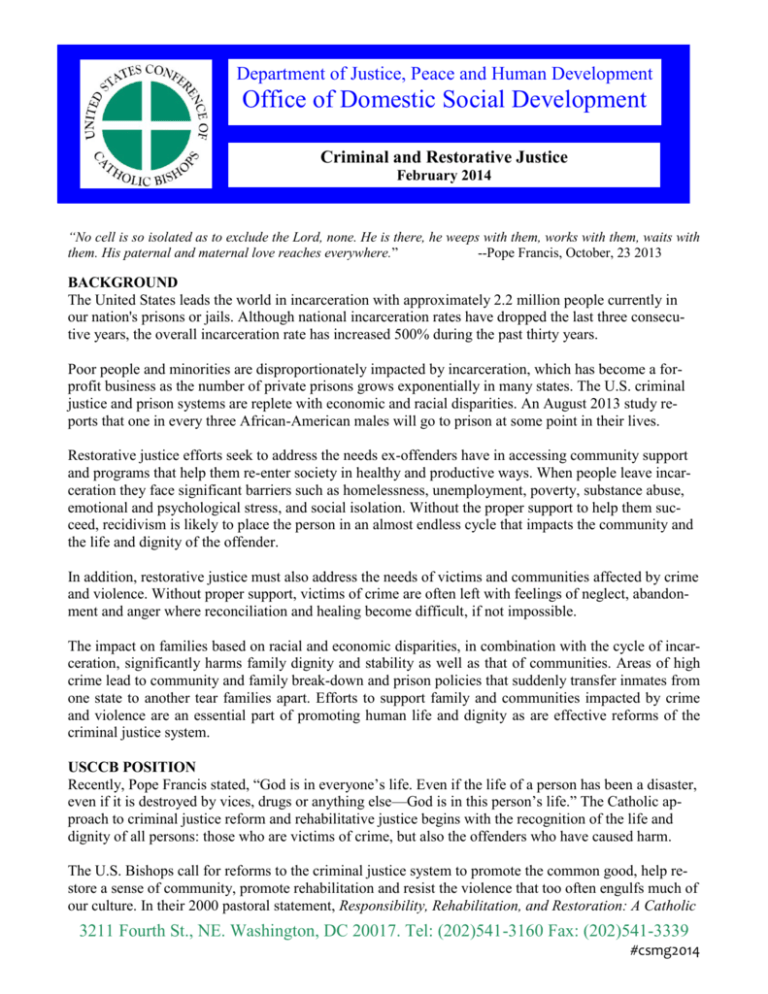
Department of Justice, Peace and Human Development Office of Domestic Social Development Criminal and Restorative Justice February 2014 “No cell is so isolated as to exclude the Lord, none. He is there, he weeps with them, works with them, waits with them. His paternal and maternal love reaches everywhere.” --Pope Francis, October, 23 2013 BACKGROUND The United States leads the world in incarceration with approximately 2.2 million people currently in our nation's prisons or jails. Although national incarceration rates have dropped the last three consecutive years, the overall incarceration rate has increased 500% during the past thirty years. Poor people and minorities are disproportionately impacted by incarceration, which has become a forprofit business as the number of private prisons grows exponentially in many states. The U.S. criminal justice and prison systems are replete with economic and racial disparities. An August 2013 study reports that one in every three African-American males will go to prison at some point in their lives. Restorative justice efforts seek to address the needs ex-offenders have in accessing community support and programs that help them re-enter society in healthy and productive ways. When people leave incarceration they face significant barriers such as homelessness, unemployment, poverty, substance abuse, emotional and psychological stress, and social isolation. Without the proper support to help them succeed, recidivism is likely to place the person in an almost endless cycle that impacts the community and the life and dignity of the offender. In addition, restorative justice must also address the needs of victims and communities affected by crime and violence. Without proper support, victims of crime are often left with feelings of neglect, abandonment and anger where reconciliation and healing become difficult, if not impossible. The impact on families based on racial and economic disparities, in combination with the cycle of incarceration, significantly harms family dignity and stability as well as that of communities. Areas of high crime lead to community and family break-down and prison policies that suddenly transfer inmates from one state to another tear families apart. Efforts to support family and communities impacted by crime and violence are an essential part of promoting human life and dignity as are effective reforms of the criminal justice system. USCCB POSITION Recently, Pope Francis stated, “God is in everyone’s life. Even if the life of a person has been a disaster, even if it is destroyed by vices, drugs or anything else—God is in this person’s life.” The Catholic approach to criminal justice reform and rehabilitative justice begins with the recognition of the life and dignity of all persons: those who are victims of crime, but also the offenders who have caused harm. The U.S. Bishops call for reforms to the criminal justice system to promote the common good, help restore a sense of community, promote rehabilitation and resist the violence that too often engulfs much of our culture. In their 2000 pastoral statement, Responsibility, Rehabilitation, and Restoration: A Catholic 3211 Fourth St., NE. Washington, DC 20017. Tel: (202)541-3160 Fax: (202)541-3339 #csmg2014 Perspective on Crime and Criminal Justice, the Bishops stated, “We call upon government to redirect the vast amount of public resources away from building more and more prisons and toward better and more effective programs aimed at crime prevention, rehabilitation, education efforts, substance abuse treatment, and programs of probation, parole and reintegration.” In their statement, the bishops raised several concerns that speak to violence in our culture and the current state of the U.S. criminal justice system: A culture that promotes and glamorizes violence and death over life and peace. An example is the continued use of the death penalty and pervasive gun violence in our society; Growing prison population that disproportionately affects minorities and poor people; Use of simplistic, one-size-fits-all solutions such as the use of mandatory minimum sentencing; Continued expansion of for-profit prisons that often prioritizes profit above the treatment, rehabilitation and re-integration of offenders into society; Policies that treat juveniles as if they were adults in the justice system; and Ill treatment of immigrants in detention and their right to fair judicial proceedings. ACTION: Remain engaged in the public debate on criminal and restorative justice reform, and urge your Senators and Representative to support policies that lift up human life and dignity, promote civility, community safety, and help reform people’s lives harmed by crime and violence. Congress has taken certain positive actions to address criminal justice reform and promote restorative justice efforts. Some of the recently introduced legislative proposals enjoy bipartisan support and include: Second Chance Reauthorization Act of 2013 (S. 1690, H.R. 3465): Authorizes funding for state and federal programs that help people leaving prison reintegrate back into their communities so that they do not reoffend. Programs focusing on education, literacy, job-placement, substance abuse treatment and other goals, help people be productive members of society. Smarter Sentencing Act (S. 1410, H.R. 3382): Proposes modest but important reforms to mandatory minimum sentences by expanding current judicial sentencing options related to nonviolent drug offenses. This bill would permit reductions in mandatory minimum sentences for certain drug crimes and allows crack cocaine offenders to seek lighter sentences under the 2010 Fair Sentencing Act. RESOURCES: Responsibility, Rehabilitation, and Restoration: A Catholic Perspective on Crime and Criminal Justice at USCCB Website: http://www.usccb.org/issues-and-action/human-life-anddignity/criminal-justice-restorative-justice/crime-and-criminal-justice.cfm USCCB Web Page on Criminal and Restorative Justice Issues: http://www.usccb.org/issues-andaction/human-life-and-dignity/criminal-justice-restorative-justice/index.cfm For further information, contact: Anthony Granado, USCCB Office of Domestic Social Development, 202-541-3189, agranado@usccb.org 3211 Fourth St., NE. Washington, DC 20017. Tel: (202)541-3160 Fax: (202)541-3339 #csmg2014






